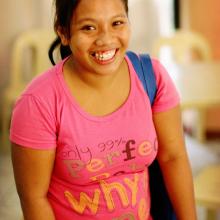rescue
If you’re reading this, you probably already know that modern-day slavery is a thriving, lucrative, global business. There are more slaves alive today than during the entire 400 years of the trans-Atlantic slave trade. Human trafficking generates about $150 billion in profits every year. And 1 in 3 trafficking victims are children.
The statistics are staggering.
For me, it was a single story that moved me through the numbers to a place where I could take action. I heard about Charina* when I joined International Justice Mission. She was one of the first girls we helped rescue in Cebu, Philippines.
Charina was 13 when she was sold for sex.
Her family was very poor, and she had dropped out of school in fourth grade. Her mother was the first one who sold her. For the next couple years, pimps took turns selling her from street corners and seedy piers. They earned extra because she looked so young.
Charina was finally freed from this harsh cycle of violence in 2007. She was addicted to drugs, pregnant and unable to trust the people who wanted to help her. The work of freedom was just beginning.
My colleagues started meeting regularly with Charina. She needed professional care and a customized plan to meet her unique and complex needs. She needed trauma-focused counseling. She needed to learn how to trust others and to believe in herself once again.
When I first heard her story and saw a photo of Charina—her bright eyes, her small frame—my first reaction was anger. This young woman should never have suffered in the many ways she has.
And that anger is right. It’s not fair.
Charina’s story has illuminated another reality for me, a more hopeful one. It doesn’t have to be this way.
AS THE SEAONS after Pentecost unfolds, we might think that summer calls for a kind of “church lite” in which we shouldn’t expect much to happen. With the dramatic commemorations behind us, the scriptures seem miscellaneous. But this season has its own purpose of soaking in the Word. Just let go of dependence on drama.
Our month’s reading opens in 2 Kings 5 with the healing of Naaman, the distinguished Aramean general, told with a dry humor that Jesus appreciated, since he specifically mentions it (Luke 4:27) in his teaching about faith found outside the bounds of Israel. At first Naaman’s dignity is offended by Elisha not bothering even to meet him in person. His pride receives a further blow in the ludicrous banality of the prescription that Elisha’s assistant passes on: “Go, and wash in the Jordan seven times” (verse 10). Naaman’s fuming about the short shrift he got, and the humiliation of being prescribed a business of splashing in a local stream, are quite comic. Paddling in the Jordan indeed—a ditch in comparison to the storied rivers of Damascus! Smiling, we recognize the storyteller’s shrewd knowledge of psychology. The tale has a good ending. Finally getting off his high horse, Naaman allows his aide to persuade him to try the simple bathing routine. Over time his skin is healed and rejuvenated.
The church behaves like that shrewd aide when it invites us to trust in the power of hearing the scriptures again and again, however overfamiliar some of them seem, and others obscure.
KRISTIN HART planned on moving to New York City to become an advertising agent with a sleek apartment and a stunning wardrobe. But one day all that changed. A humble missionary couple spoke at her church in Gainesville, Fla., about their experience fighting human trafficking in Asia, and after hearing the horrors of slavery, Hart knew she had to do something.
As she prepared to graduate from college in 2011, she applied for an internship with International Justice Mission (IJM), a Christian organization that rescues victims from trafficking and other violent oppression. A few months later, she found herself confronting the harshest cases of exploitation in south Asia.
“I saw people forced to work 18 hours a day, with their families taken from them,” Hart says. “I never imagined that humanity could be stripped from a person like that.”


